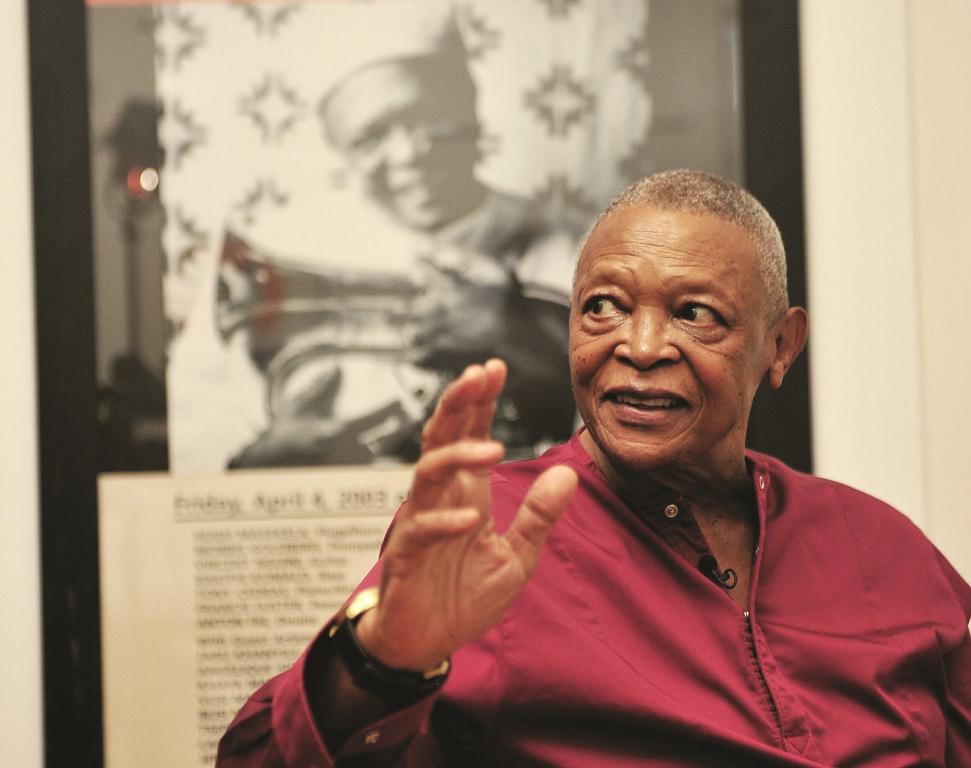Away from a baying crowd of women with weaves, Hugh Masekela swaggers into a television studio on Fox Street in Johannesburg for a talk show. Earlier that day, he was on a talk radio station fielding questions on his disdain for synthetic hair and the popularity of weaves among African women. His remarks, and his refusal to pose with fans with synthetic hair, attracted the ire of women across South Africa.
“If he’s okay with weaved women paying money to come see his concerts then he should afford those fans the privilege of taking pictures with him,” SABC radio personality KG Moeketsi posted on Facebook.
“This thing is tired and unnecessary. We already deal with way too much misogyny, being belittled by men we love, and workplace discrimination, to not be afforded the right to wear our hair the way we want to. Mind you, I’ve never worn a weave in my life, but the right to choose your hairstyle has never been parallel to your taste in music.”
But Masekela is having none of it.
“It’s not about weaves,” says Masekela. “It’s not about weaves at all. You know, it’s about other people’s hair. Like some people wear synthetic, and some even use horsetail hair. But it’s not even about that.”
Loading...
“Africans and Europeans have had a long historical issue about African hair. When we first encountered Europeans, they laughed at our hair because it was hard. And, historically we’ve been given an inferiority complex, not only about who we are but about our noses being flat, our lips being big, our asses being big, and things like that.”
“And of course we were defeated, you know, in trying to defend Africa. We were enslaved, then we were urbanized, then we were also ‘religionized’. So we’re very far from who we really are originally.”
“We are the only society that imitates other cultures. I mean we wear their clothes and everything. But the saddest part is how far we have come with trying to not look like ourselves.”
“Religion and urbanization have made Africans really believe that their own heritage is barbaric, savage, primitive, backwards, uncivilized and all those words. Psychologically, over the centuries we’ve been conditioned to think that our heritage is not good, that it’s inferior.”
The weave and what it represents is part of a much bigger picture, he says.
“Hair is one of the areas in which we’ve been put down,” he says. “But then we became exploited because apart from the issues of heritage we are the biggest hair market in the world. We spend tens of billions of dollars a year buying other people’s hair. And from a heritage and traditional perspective, that is sort of macabre.”
“So I don’t mind people wearing what they wanna wear, as long as I don’t have to take pictures with them. That’s all. It’s much more than me being an eccentric old man. There’s a whole history to it.”
“But it’s absurd when Africans fall over their feet to get their hands on blonde wigs. I mean I look at Umhlanga (the reed dance)… Half of those kids are wearing blonde wigs and weaves, and they don’t go with traditional clothes. You know, it’s the same as going skiing barefoot. It’s that absurd. But then they also put it on the children. A lot of them put it on their children. If you look at the little school children in this country, almost all of them have had their hair tampered with – their hair, in way or another, has been tampered with.
“If you saw the movie Hotel Rwanda, which was made here, you can see that they tried to wash all the kids’ hair so they look like Rwandans. And all the kids’ hair was ginger from refusing to be washed and it was still standing up by the time they were shooting. It passed over everybody’s head… people didn’t seem to notice.”
Bra Hugh, as the legendary trumpeter is affectionately known, is even disappointed by his own family.
“I was at a wedding just outside Polokwane in South Africa,” he says. “There were Venda relatives of mine and most of them were in traditional Tshivenda garb, but almost all the women were wearing weaves and wigs. One niece of mine had a red, black and yellow wig, a really shiny piece, and she had a matching one on her daughter who was three years old.”
“What that says to me is that, psychologically we have really been messed with. We are buying people’s hair but they are not buying any of our s***, except maybe a little art and craft… You know, it’s a sad joke.”
Back at the TV studio, Masekela moves on to sign autographs and I watch closely as my plus one asks Bra Hugh for a picture. Like many others in the room, my companion is sporting braids that are reinforced with synthetic hair. Masekela politely signs her book before posing with her for pictures.
Perhaps he didn’t feel like splitting hairs that day.
Loading...
